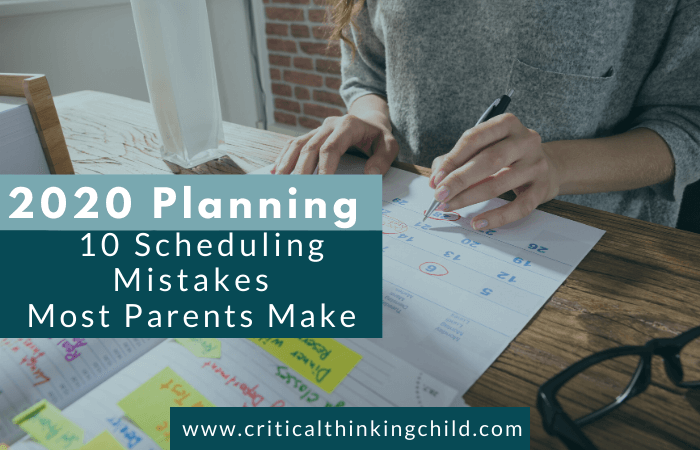Managing the schedule for your entire family can feel like a full-time job. Between clubs, sports, school commitments, and social obligations, it’s hard to find a spare moment. Even the best of intentions can go awry, leaving you with a hectic schedule that impacts your child’s academic success and stress levels.
The first step to taming your wild schedule is to understand how it got so out of control in the first place. Time management is never easy, especially when you’re trying to navigate the needs of your whole family, but it is possible. And when you create a balanced schedule, you’re better able to support your child as they grow both socially and academically.
Even the most well-intentioned parents can fall into scheduling mayhem. Take a look at some of the most common scheduling struggles, as well as time management tips for parents. From these, you can build a schedule that keeps you sane and sets your child up for success.
Struggle #1: Saying yes before checking your schedule
No is a powerful word, and it’s one that isn’t used nearly as often as it should be. It’s so easy to agree to an obligation on the spot, especially if it’s something that sounds fun for you or your child. Unfortunately, this often leads to double-booking and an awkward cancellation; or overbooking, which becomes stressful for everyone.
The Fix: When someone proposes a new activity or event, don’t say yes right away. Instead, thank the person who offered up the invitation and let them know you’ll get back to them once you check your schedule — even if you think you’re available.
Building in this extra time allows you to make sure you’re actually free during that time. Even better, it gives you the chance to check in with your child to see if it’s an activity that makes sense with them, as well as check other commitments on the days and weeks surrounding the activity. A little extra time can go a long way towards making sure your family has the bandwidth to take on another obligation.
Struggle #2: Overscheduling kids with too many activities
Soccer, piano lessons, tutoring, church groups, painting classes… these all sound great, and each will help your child develop important life skills. Press pause, though; overscheduling your kids with more activities than they (and you) can handle will lead to chaos at home.
Most kids are strongly interested in one or two activities, so forcing them to participate in activities that they aren’t passionate about will leave them stressed and fatigued. Additionally, carting your child to a different activity every day of the week takes its toll on you, as a busy parent.
The Fix: Unstructured play time is just as valuable as structured activities. Playing outside, creating art projects at home, and having space to relax after a long day at school is critical to academic success. Instead of scheduling every activity you can think of, come up with a year-long calendar for your family, and select one or two activities per child per season. Involve your child in these discussions so you can discover which activities excite your child.
Struggle #3: Relying too heavily on technology
Although digital calendars, like those offered through Google, Outlook, or Apple, are convenient and easy to use, they actually have some drawbacks. For one, digital calendars are no help if you break or lose your phone. In addition, a written calendar improves brain memory in ways that technology-driven calendars simply don’t.
The Fix: Don’t ditch your digital calendar, but supplement it with a handwritten backup. Just like journaling, the act of physically writing down an obligation helps it stick in your brain, which means you’re less likely to forget about it.
Struggle #4: Waiting until March to plan spring break
We’ve all been there. You make it through the craziness of the holiday season, get your groove back in January and February, and glance at the calendar only to see that your child’s spring break is in a matter of weeks! This creates panic for all involved and makes spring break opportunities narrower and more expensive.
The Fix: Consider planning spring break activities as early as October or November. This may seem way too early, but it will feel so much better to have it taken care of in advance. Many camps and enrichment opportunities start advertising in the fall, and even if they’re not open for registration, you can decide which ones you want to sign up for. If you’re traveling as a family, booking early will help you save on lodging, airfare, and activities.
Struggle #5: Waiting until June to plan summer break
Similarly, don’t wait until June to plan summer break! At this point, most of the camps and summer programs you’re interested will have filled up long ago. Any spots that are remaining will probably be more expensive because you missed the early registration rate. It may be difficult for you to get time off work to travel, and lodging in popular destinations may be full.
The Fix: Sit down as a family in the spring to discuss what you want to do over the summer. Have your children create a “top 3” list of camps or trips they want to take, and research those. We recommend planning big family vacations at least a year in advance, which will allow plenty of time to prepare.
If you’re not sure where to start, check with your school district. Many schools offer a summer program showcase in February or March. Events like these often have representatives from a wide array of summer programs, from sports camps to coding programs to kayaking classes.
Struggle #6: Not scheduling time off around high stakes tests
Tests can be stressful, especially high-stakes placement tests, like gifted enrollment exams. When you pair an anxiety-inducing test with an already chaotic schedule, it can only make it worse for your child. They may not have enough time to study, to practice, or to relax before the exam.
The Fix: Make sure that in the week leading up to the test, as well as testing week itself, your child has minimal commitments. Instead, they can spend their time studying at home or relaxing.
In addition, if it’s at all possible with your work schedule, consider taking time off to support your child during the week of a high-stakes test. Don’t worry about this for a routine classroom test, like a unit math test, but for end of grade or end of course tests, this will allow you and your family some flexibility. You can take your child out for a special breakfast before the test, drive them to school if they usually take the bus, and maybe even pick them up early if they were particularly stressed about the test.
Struggle #7 Not scheduling in digital breaks
The opportunity to interact with technology is everywhere, and odds are your child is spending a lot of time looking at a screen. This isn’t all bad — after all, there are a ton of valuable learning games that leverage technology. But not scheduling in time to take a break from the screen means that your child may miss out on some pretty amazing analog learning experiences. Not only that, but studies have shown that the blue light screens produce interrupts sleep cycles. Breaks are critical for helping your child balance their online and offline activities, so they don’t rely on technology alone.
The Fix: Set technology-free time in your schedule. For example, you may decide that you don’t want anyone using technology before school in the mornings. Make sure it’s on your schedule to remind you, and reinforce this boundary every day! Or maybe you only let your child play learning games for an hour at a time (most devices have parental controls that allow you to set the amount of time your child is allowed access).
You can also create technology-free zones within your house. The kitchen table, for example, may not be an appropriate place for the phone to come out.
Struggle #8 Not scheduling time for extra academic support or tutoring
These days, schools maintain a fast pace of learning. Teachers are given a huge amount of content to cover and a limited time to do so. As a result, it can often be a struggle for kids to keep up. They need more practice than the typical school day allows. Unfortunately, kids are often so busy outside of school that there’s no time to reinforce their learning. This leads to them falling behind, losing confidence, and getting frustrated with new concepts.
The Fix: Schedule in time for the extra academic support your child may need. Even if they don’t seem to need help on the surface, taking time to reinforce new concepts can only help your child grow. Tutoring benefits all students, not just those who are at risk of failing or trying to place into a gifted program.
Struggle #9: Skipping out on naptime
How often have you, as an adult, wished that you could incorporate naps back into your day? So often, we’re running from the moment we wake up to the second our head hits the pillow — and it’s exhausting! This is no different for your child, and at a young age breaks are even more important. When you don’t take time for a midday siesta, or you cut back on your child’s sleep time, you’re not giving their brain the rest it needs to process new information.
The Fix: Embrace naptime! Don’t schedule any activities during the time you set aside for rest. In addition, avoid scheduling anything too early or too late in the day, so your child has plenty of time to wind down and gear up for the day. You can take advantage of this downtime, too — odds are, you’re also not getting as much sleep as you could.
Struggle #10: Forgetting to block off time for movement
With such a strong emphasis on critical thinking skills, academic success, and high-stakes tests, it’s easy to forget about physical activities. But movement actually supports learning, and when your child is able to run, jump, and play, they reinforce important lessons. Skipping out on movement can lead to lethargy, frustration, and an inability to focus.
The Fix: Just like you schedule in time for studying, block off time for moving. Consider enrolling your child in a class that’s geared towards physical activity (rather than strictly academic learning), set aside physical playtime at home, and give your child the chance to expend their energy in a productive way.
Strong time management skills supports academic success
While scheduling can be stressful, many of these common mistakes have quick and easy fixes. And when you get a firm handle on your schedule, it benefits the entire family. Your child will enjoy their activities more, and you won’t feel so pressured. A few small changes can really make a big difference!



